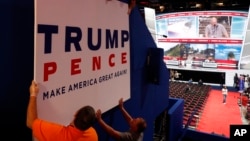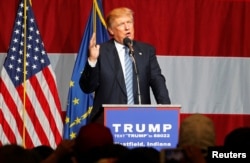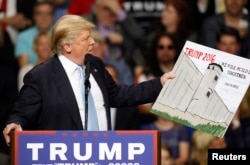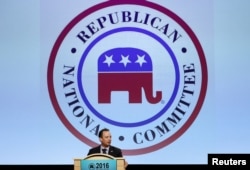Every political party has its tensions.
But as Republicans gather in Cleveland for their convention, party members have had to come to terms in very personal ways with the change and unrest that brought Donald Trump to the presidential nomination. Most of them have values and answer to identities that appear to be from an entirely different party – and could mean very different things for its future.
Walking through the memento-packed rooms of his Harrisburg, Pennsylvania, office, Republican strategist Charlie Gerow has a souvenir and a story from every Republican convention since 1976. He recalls his days as a “young pup” helping the Reagan campaign, through serving as a delegate at the conventions that elected the Bushs, McCain and Romney.
This year is different.
Gerow will attend the convention but not as a delegate. A slate of Trump supporters was elected to represent his home district. He says the party heading into Cleveland with Donald Trump as its unlikely head has the variety of factions and elements and tensions that any major political party has and must have to remain dynamic.
“After the convention, I think you will see a lot of Republicans who haven't yet gotten on board coalescing around the Trump candidacy largely because Hillary Clinton is on the other side,” says Gerow.
But that view is the biggest problem for long-term sustainability, says Beth Silvers, co-host of Pantsuit Politics, a podcast that includes nuanced perspectives from the left and the right. Like many younger Republicans, Silvers is concerned the party has built its identity around opposition to – rather than support of – ideas.
“You are hardening the Republican party as a party against things,” she says. “That’s part of what brought us here – we’re against every idea that President Obama had, we’re against all the ways that Democrats want to use government to solve problems, we’re against gay marriage, we’re against Hillary Clinton and at some point we have to come out and be for things.”
In the days leading up to the convention, there’s been no better test case for the way the different elements of the party deal with ideas than the hot-button topic of immigration.
The case of immigration
The Republican Party famously released an “autopsy” report after the mid-term electoral losses of 2012, calling for a more inclusive appeal to younger, diverse voters that included advancing immigration reform.
But Trump found success as a candidate in 2016 by directly contradicting that view, using inflammatory language against Latinos to call for a border wall between Mexico and the United States. According to a Pew Research Center poll this spring, Trump supporters significantly differ from Republican voters on foreign policy and immigration issues. Eighty-four percent of Trump voters favor building the wall with Mexico, while 56% of other candidates' supporters favor that policy.
“You have the establishment who is taking the line that is ‘We know better than you do. Please take our lead.' That’s essentially what they’re telling their voters: 'Donald Trump isn’t good for you. We know what is good for you,'” says John Hudak, a senior fellow in governance studies at the Brookings Institution.
Even Gerow – who initially worked on Carly Fiorina’s campaign this election cycle and who has said he supports candidates who will carry on Reagan Republicanism – admits Trump has brought new voters who need to be heard to the party.
“Donald Trump clearly reaches out to some folks who are not traditional Republicans, working-class Democrats in particular, some independents as well because he has touched on their frustration and their concerns about their future,” says Gerow.
But Trump would reverse decades of Republican support for free trade, has criticized George W. Bush and the Iraq war, and has held inconsistent views on social issues such as abortion.
“It’s certainly not a party speaking in one voice,” says Hudak. He describes the Republican Party as being in a “strained and unique place,” seeking a balance between the social conservative wing that approaches public policy with a religious perspective and “another part of the party that sort of turns its nose up at social issues and just focuses exclusively on economics and wants smaller government, lower taxes, better opportunities for business investment.”
The party also attracts libertarians and millennial voters who seek a middle way. For her part, Silvers says she doesn’t understand how a party that stands for capitalism and the free market can be so strident about immigration. She says the way forward is re-focus the party on local-based problem solving and “creating transparency around prices so the market can work.”
That transparency could also extend to the leadership.
“I think voters would appreciate hearing from some Republican leaders right now – yeah, we’re lost right now and we need to start listening and some soul-searching about this party. And that hasn’t happened in the committees that have been standing forever, and it’s probably not going to happen at the convention.”
Who controls the future?
A 54% majority of Republican and Republican-leaning registered voters said they doubted the party will unite behind Trump, compared to 65% who thought the party would united behind Mitt Romney in 2012, according to a Pew poll this month.
“There’s a real resignation among Republicans that this is going to be a blown cycle,” says Hudak. He says Trump does little to broaden the party’s appeal, doubling down on his core constituency of white males. But blaming an electoral loss on the failure to nominate a true conservative would be another mistake.
“If that true conservative is someone like Ted Cruz, they’re going to lose again in 2020 because his message doesn’t resonate with the demographic groups that they are consistently losing,” he says.
While Silvers is not a Trump supporter, she says does agree with his voters who see problems in the party.
“Win or lose his nomination – and if it occurs, his presidency – have to be a real wake-up call for the party.”
But Gerow, who has watched Republican administrations come and go, says the core of the party has remained strong.
“The Republican Party remains a center-right party, it remains a party that’s focused on economic growth and economic opportunities, strong foreign policy and national defense and social conservative values,” he says.
“That has been the Republican Party of my lifetime, and I think it will be the Republican Party in the future as well.”














